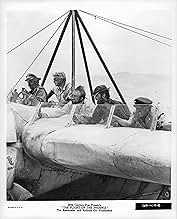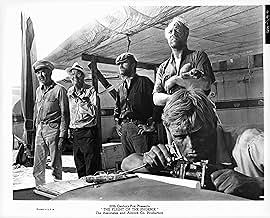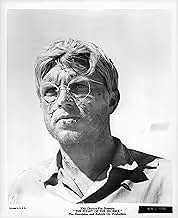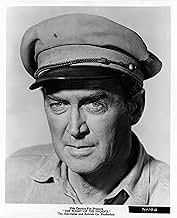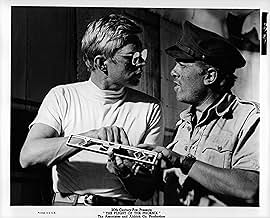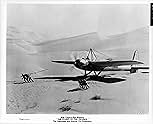IMDb-BEWERTUNG
7,5/10
23.408
IHRE BEWERTUNG
Nach einem Flugzeugabsturz in der Sahara behauptet einer der Überlebenden, er sei ein Flugzeugbauer und man könne ein flugtaugliches Flugzeug aus dem Wrack bauen.Nach einem Flugzeugabsturz in der Sahara behauptet einer der Überlebenden, er sei ein Flugzeugbauer und man könne ein flugtaugliches Flugzeug aus dem Wrack bauen.Nach einem Flugzeugabsturz in der Sahara behauptet einer der Überlebenden, er sei ein Flugzeugbauer und man könne ein flugtaugliches Flugzeug aus dem Wrack bauen.
- Regie
- Drehbuch
- Hauptbesetzung
- Für 2 Oscars nominiert
- 6 Nominierungen insgesamt
Hardy Krüger
- Heinrich Dorfmann
- (as Hardy Kruger)
Chris Alcaide
- Arab Leader
- (Nicht genannt)
Stanley Ralph Ross
- Arab Singer
- (Synchronisation)
- (Nicht genannt)
Empfohlene Bewertungen
Returning from an oil field with a plane full of crew etc going on leave, Frank Towns' plane enters a sandstorm over the Sahara desert and crashes. As various attempts at rescue or escape fail one passenger, Dorfmann suggests his plan to rebuild the plane as a smaller version and attempt to fly out, leaving the bulk of the damage craft behind. However tensions mount as personalities conflict as all the men face death.
I had only ever heard of this film before I finally got round to watching it last night on television. I was aware of the basic plot and had assumed it was more recent that it actually was. I watched it assuming that it was made in the early seventies when the disaster movie genre was just starting to take off (sorry accidental pun). However this was made prior to this and is probably a much better film for it in the seventies the film would have required more spectacle, so the crash would have been much more dramatic and horrifying. As it is now, the film is more about the men under stress than it is about anything else.
This is brought out well and the majority of the drama and tension within the film is as much from these conflicts as it is from the pressure to escape the desert. The film is longer than I expected it to be but it pretty much sustains itself for that length. The main reason for the film working so well is the cast, which has it's fair share of famous faces but also has more than it's fair share of good performances.
Stewart is really strong in the lead (although, in fairness, there is no one main character) and becomes increasingly grizzled as the film goes on. His character is not without flaws even if he does come out of this well. Attenborough is also good but is less evident in the film than some of the others. Krüger has the least pleasant of the roles given that he plays a tough German. He manages to make the character likeable while still going about his task with a strict organised German air to him. Finch is good and is well supported by Fraser. The support cast includes strong performances from Borgnine, Bannen, Kennedy, Marquand and the director's own son is thrown in for colour!
Overall this is much better than the disaster-type movie I had expected as it is a film where the plane crash isn't a blaze of spectacle and the death scenes aren't played out for full effect. Instead it is a tension adventure story that is driven by some great performances by a cast full of well known actors.
I had only ever heard of this film before I finally got round to watching it last night on television. I was aware of the basic plot and had assumed it was more recent that it actually was. I watched it assuming that it was made in the early seventies when the disaster movie genre was just starting to take off (sorry accidental pun). However this was made prior to this and is probably a much better film for it in the seventies the film would have required more spectacle, so the crash would have been much more dramatic and horrifying. As it is now, the film is more about the men under stress than it is about anything else.
This is brought out well and the majority of the drama and tension within the film is as much from these conflicts as it is from the pressure to escape the desert. The film is longer than I expected it to be but it pretty much sustains itself for that length. The main reason for the film working so well is the cast, which has it's fair share of famous faces but also has more than it's fair share of good performances.
Stewart is really strong in the lead (although, in fairness, there is no one main character) and becomes increasingly grizzled as the film goes on. His character is not without flaws even if he does come out of this well. Attenborough is also good but is less evident in the film than some of the others. Krüger has the least pleasant of the roles given that he plays a tough German. He manages to make the character likeable while still going about his task with a strict organised German air to him. Finch is good and is well supported by Fraser. The support cast includes strong performances from Borgnine, Bannen, Kennedy, Marquand and the director's own son is thrown in for colour!
Overall this is much better than the disaster-type movie I had expected as it is a film where the plane crash isn't a blaze of spectacle and the death scenes aren't played out for full effect. Instead it is a tension adventure story that is driven by some great performances by a cast full of well known actors.
"The Flight of the Phoenix", based on the Elleston Trevor novel, has little more than one set and no costume changes; and the action is confined to the few yards around an airplane crashed in the desert. Yet its story is more gripping than most "action" movies.
An old airplane owned by an oil company crashes at the hands of a crusty old pilot (James Stewart) whose bitterness and fatalism are brought out when he's forced to admit the crash was due to pilot error. His half-alcoholic navigator has insured that the plane was off course, and cannot be discovered by rescue craft (if any); he's a nice guy and becomes the mediator between the rancorous passengers and crew, but he lacks self-confidence (Richard Attenborough in a finely understated performance). The passengers include a company accountant (Dan Duryea); a shell-shocked employee (Ernest Borgnine, by turns touching and silly) sent home in the company of his doctor (Christian Marquand); a straight-laced British officer (Peter Finch) and his mutinous sergeant (Ronald Fraser); several oil company employees, including one who is always making vicious jokes at the expense of the others (Ian Bannen); and a German "designer" (Hardy Kruger) who went to the oil fields to visit his brother.
Stranded in the desert with no hope of rescue, they debate various schemes for salvation, all of which fail, until Kruger tells the others he is an airplane designer and he has discovered a way to build a new plane from the spare parts of the old one. All it needs for a handful of unskilled men, living on a little water and no food but pressed dates, coping with unbearable heat during the day and unbearable cold at night, to transform themselves into aircraft manufacturers before they all succumb.
All performances are good. Some of the actors (George Kennedy, the always interesting Dan Duryea) are woefully underused -- perhaps large segments of their roles wound up on the cutting-room floor. The major tension is the confrontation between Stewart's old-school pilot and Kruger's technologically self-righteous engineer (at one point, Stewart's character makes the incredibly prescient remark that one day the little men with their slide-rules and computers will inherit the earth).
Even when they all decide they'd rather attempt building the new plane with hope than sit around watching each other die, new surprises spring up that compromise the whole thing.
The script and the acting are solid, especially James Stewart in a different and challenging role. The music is sometimes overwhelming, and stings give unnecessary emphasis to some lines. Also of interest is the listing in the credits of "The Love Theme" which seems like a silly thing to call it.
A superlative story of men living on the ragged edge of survival, working together but not necessarily getting along or surrendering their own values.
An old airplane owned by an oil company crashes at the hands of a crusty old pilot (James Stewart) whose bitterness and fatalism are brought out when he's forced to admit the crash was due to pilot error. His half-alcoholic navigator has insured that the plane was off course, and cannot be discovered by rescue craft (if any); he's a nice guy and becomes the mediator between the rancorous passengers and crew, but he lacks self-confidence (Richard Attenborough in a finely understated performance). The passengers include a company accountant (Dan Duryea); a shell-shocked employee (Ernest Borgnine, by turns touching and silly) sent home in the company of his doctor (Christian Marquand); a straight-laced British officer (Peter Finch) and his mutinous sergeant (Ronald Fraser); several oil company employees, including one who is always making vicious jokes at the expense of the others (Ian Bannen); and a German "designer" (Hardy Kruger) who went to the oil fields to visit his brother.
Stranded in the desert with no hope of rescue, they debate various schemes for salvation, all of which fail, until Kruger tells the others he is an airplane designer and he has discovered a way to build a new plane from the spare parts of the old one. All it needs for a handful of unskilled men, living on a little water and no food but pressed dates, coping with unbearable heat during the day and unbearable cold at night, to transform themselves into aircraft manufacturers before they all succumb.
All performances are good. Some of the actors (George Kennedy, the always interesting Dan Duryea) are woefully underused -- perhaps large segments of their roles wound up on the cutting-room floor. The major tension is the confrontation between Stewart's old-school pilot and Kruger's technologically self-righteous engineer (at one point, Stewart's character makes the incredibly prescient remark that one day the little men with their slide-rules and computers will inherit the earth).
Even when they all decide they'd rather attempt building the new plane with hope than sit around watching each other die, new surprises spring up that compromise the whole thing.
The script and the acting are solid, especially James Stewart in a different and challenging role. The music is sometimes overwhelming, and stings give unnecessary emphasis to some lines. Also of interest is the listing in the credits of "The Love Theme" which seems like a silly thing to call it.
A superlative story of men living on the ragged edge of survival, working together but not necessarily getting along or surrendering their own values.
Where as many films with star casts have failed, this one does not.
This film oozes quality by the bucket load. It centres round the story of the survivors of a plane crash who attempt to build a plane out of the wreckage. The tension is apparent from the start with the heat of the desert alone almost driving the characters to madness.
The combination of brilliant script and excellent acting brings to the fore a brilliant film. Ian Bannen, in particular, gives gives both grit and relish in his possibily his greatest screen performance.
This film oozes quality by the bucket load. It centres round the story of the survivors of a plane crash who attempt to build a plane out of the wreckage. The tension is apparent from the start with the heat of the desert alone almost driving the characters to madness.
The combination of brilliant script and excellent acting brings to the fore a brilliant film. Ian Bannen, in particular, gives gives both grit and relish in his possibily his greatest screen performance.
THE FLIGHT OF THE PHOENIX is a classic tale of derring-do and adventure, a sort of DIRTY DOZEN style movie in which a group of stranded survivors find themselves trapped in a hostile desert and must use their wits in order to survive. It's a tale of bravery, heroism and cowardice in equal measure, as each man must come to terms with what he can do in order to survive, and it's a perfect lesson of how working as a group can always outdo individual effort.
The film is well-shot by Robert Aldrich, who brings the sandy locales to life, even if the studio-shot bits are fairly obvious in comparison to the genuine location shooting. The cast is full of solid, tough guy talent: Ernest Borgnine, Ian Bannen, Ronald Fraser, Peter Finch, George Kennedy and Richard Attenborough are fine, but it's Jimmy Stewart who headlines and holds things together as the old hand. Hardy Kruger bags the most interesting role as the engineer, and how many films about engineering are this gripping? I can't think of any others if I'm honest.
A word of warning: avoid the horrid remake, which just slavishly copies the plot of this film but does everything wrong. I think the most annoying thing about it was the casting director's choice to put the inferior Dennis Quaid into the Jimmy Stewart role. I mean, what were they thinking?
The film is well-shot by Robert Aldrich, who brings the sandy locales to life, even if the studio-shot bits are fairly obvious in comparison to the genuine location shooting. The cast is full of solid, tough guy talent: Ernest Borgnine, Ian Bannen, Ronald Fraser, Peter Finch, George Kennedy and Richard Attenborough are fine, but it's Jimmy Stewart who headlines and holds things together as the old hand. Hardy Kruger bags the most interesting role as the engineer, and how many films about engineering are this gripping? I can't think of any others if I'm honest.
A word of warning: avoid the horrid remake, which just slavishly copies the plot of this film but does everything wrong. I think the most annoying thing about it was the casting director's choice to put the inferior Dennis Quaid into the Jimmy Stewart role. I mean, what were they thinking?
"The Flight of the Phoenix" is Robert Aldrich's classic survival story about a group of men who crash land a plane in the desert and must find a way out or die. James Stewart is the pilot and de facto leader of the group; they look to him initially as the most experienced and authoritative. But he eventually butts heads with a young German (Hardy Kruger) who claims to be a designer of airplanes and decides that the only way to survive is to construct a new plane from the undamaged parts of the old one and fly to safety. In Aldrich's hands, this plot becomes a study in generational conflict, with a younger, fresher attitude about things proving to be more valuable than the traditional. The film itself is very traditional in many respects, but it's this attitude about the younger generation that exposes its roots in the counter culture that was only just beginning to make its presence felt in the films of the time. If it had been made a decade earlier, Stewart would have been our hero, no questions asked, just because he was Jimmy Stewart. In the film as it plays out, Stewart's stubborn adherence to an old way of doing things would have resulted in everyone dying if they had followed his advice.
Out of a terrific ensemble of male actors, Ian Bannen was inexplicably singled out with an Academy Award nomination for Best Supporting Actor. He's by no means bad, but if I was going to single out anyone, it would certainly be either Kruger or Richard Attenborough as Stewart's long-time friend and confidante.
The film also received an Oscar nomination for Michael Luciano's editing. Luciano was a frequent Aldrich collaborator and received nominations for three other Aldrich films: "Hush...Hush, Sweet Charlotte," "The Dirty Dozen" and "The Longest Yard."
This is a fun, exciting movie.
Grade: A
Out of a terrific ensemble of male actors, Ian Bannen was inexplicably singled out with an Academy Award nomination for Best Supporting Actor. He's by no means bad, but if I was going to single out anyone, it would certainly be either Kruger or Richard Attenborough as Stewart's long-time friend and confidante.
The film also received an Oscar nomination for Michael Luciano's editing. Luciano was a frequent Aldrich collaborator and received nominations for three other Aldrich films: "Hush...Hush, Sweet Charlotte," "The Dirty Dozen" and "The Longest Yard."
This is a fun, exciting movie.
Grade: A
Wusstest du schon
- WissenswertesThe Phoenix's take-off was considered too dangerous to stage at the sandy filming location (its actual take-off was from a smoothed, compacted-earth runway), so legendary stunt pilot Paul Mantz was asked to do a "touch-and-go" landing in which he came in low, skimmed his landing gear along the ground, then throttled up to gain altitude, merely simulating a take-off. On the second take, as the landing gear made contact with the ground, the plane's aft boom fractured, causing the aircraft to nose into the ground and cartwheel, killing Mantz. As the second take had merely been a "protection shot," with the necessary footage captured during the first attempt, a vintage North American O-47A observation plane from an air museum was substituted for the remaining necessary close-ups.
- PatzerThe airflow over the wings would be so compromised by the wind shields and the men behind them that the plane would simply not fly. Indeed, the Phoenix stunt plane built for the film suffered severe aerodynamic drag from the dummies that were put on the wing to simulate the passengers. The dummies had to be replaced with thin plywood silhouettes erected parallel to the fuselage that did not obstruct the airflow.
- Zitate
Heinrich Dorfmann: Mr. Towns, you behave as if stupidity were a virtue. Why is that?
- Crazy CreditsClosing credits epilogue: IT SHOULD BE REMEMBERED...
THAT PAUL MANTZ, A FINE MAN AND A BRILLIANT FLYER GAVE HIS LIFE IN THE MAKING OF THIS FILM...
- VerbindungenFeatured in Film Preview: Folge #1.4 (1966)
- SoundtracksThe Phoenix Love Theme
Senza Fine"
Sung by Connie Francis
Music & Italian Lyrics by Gino Paoli
English Lyrics by Alec Wilder
Top-Auswahl
Melde dich zum Bewerten an und greife auf die Watchlist für personalisierte Empfehlungen zu.
Details
Box Office
- Budget
- 5.355.000 $ (geschätzt)
- Laufzeit2 Stunden 22 Minuten
- Farbe
- Seitenverhältnis
- 1.85 : 1
Zu dieser Seite beitragen
Bearbeitung vorschlagen oder fehlenden Inhalt hinzufügen





